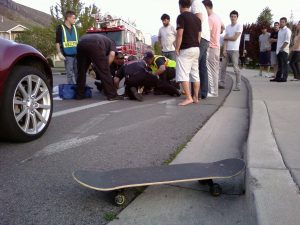3 Common Mistakes

Why take a course in writing for broadcast? Why not just watch, listen and emulate what you see and hear? The reason is simple: because even people who are good at this get in a hurry and write poor and sometimes libelous copy. In this chapter, we’ll look at four common mistakes and some just annoying stuff that keeps getting used.
Allegedly
Do your viewers know what this word means? Do you? Reporters use it to avoid accusing or convicting people who may have committed a crime: NED WAS ARRESTED AFTER HE ALLEGEDLY ROBBED THE FIRST NATIONAL BANK. THE ALLEGED ROBBER WAS FOUND ON THE SIDE OF THE FREEWAY WITH A MONEY-BAG LOCATING DEVICE SHORTLY AFTER THE BANK WAS ROBBED. There are two writing crimes here: First, the word “alleged” gives you no legal protection from lawsuits. This situation happened in Sacramento, California, when I worked there. Person A robbed a bank and threw the security device from the loot bag out the window on Interstate 5. Person B picked it up before the police arrived and they arrested him. Person B was later cleared, but not before his image and name were dragged around on the evening news.

According to the Reporters Committee for Freedom of the Press, you can use allege:
Only if you attribute the statement to an official source that you are privileged to report. If you opt to use the verb “allege” in a crime story, the subject of the sentence should be police, the lawsuit, an indictment or some other official source, which is then fairly and accurately reported.
When used legally, it is essentially a non-conversational way to say said.
Second, allegedly, in all its forms, is a throwaway word your viewer doesn’t understand. It would be more conversational and understandable to say: POLICE ARRESTED NED AFTER THEY SAY HE ROBBED THE FIRST NATIONAL BANK. THEY SAY THEY FOUND HIM ON THE SIDE OF THE FREEWAY WITH A MONEY-BAG LOCATING DEVICE SHORTLY AFTER THE BANK WAS ROBBED. All alleging is gone, whatever that is, and we know who is accusing him. We can also form our own doubts about whether Ned robbed the bank or not. If you never use allege, alleged, allegedly, you will do well.
Suspect
This word is a problem waiting for a good lawyer. We begin with a three-part syllogism:
Socrates is a man.
All men are mortal.
Therefore Socrates is mortal.
When someone says a suspect committed a crime, as opposed to a criminal, and then name someone as a suspect, they are convicting that person the same way:
The suspect robbed the bank.
Ned is the suspect.
Therefore Ned robbed the bank.
Once again, a crime with two consequences. First, you convicted Ned. Give the guy his trial first. Second, you have missed the opportunity to use much better words. Robbers rob, not suspects. Rapists rape. Thieves steal things. Burglars burgle (which is fun to say aloud). Killers and murderers kill people. Crooks do all the other stuff you don’t have a specific crime word for. All suspects do is get arrested and tried. I heard a tease recently where the anchor said there was a “suspect on the loose.” A suspect? Who cares? Tell me there’s a rapist, a murderer, or a burglar on the loose and I may react.
A suspect is someone with a name or very distinct look, which comes from a photo or video, not a written description. Even when that person is in custody, they are still a suspect accused of the crime that the robber, murderer, or scam-artist did. Do not convict them by using the same word.
I shot the video of the guy in the screen freeze below. Cops say they pulled him over for a traffic violation, and because he had warrants, he called 911 while the officer was running his license, telling dispatchers that there was a gunman at the nearby Walmart. The officer took off on the fake call, and cops say this guy got away. Cops say they figured out the ruse and found him at his house, holed up in an attic. I attributed all the preceding information to the police. Someone probably did all that, but the guy being led away in handcuffs is the suspect, not necessarily the guy who did it. On TV that night, his face was shown and he was described as the suspect. But if the person writing the story had said the suspect did all the bad things, and then we showed this identifiable guy and called him the suspect, they would’ve convicted him. Because I did not follow the case through the courts, I have covered his face here.
Apparently
What does this mean? Does it mean X may have happened? Does it mean you’re not sure exactly what happened, but it looks like A may have caused B? It’s not only OK to say that, but it’s far more conversational. Exhibit A:

NEIGHBORS FOUND NED WITH A BRUISED HIP AFTER HE APPARENTLY FELL OFF HIS SKATEBOARD.
Neighbors saw Ned on the ground with his skateboard nearby, but no one saw him fall, so apparently is a cheap guess. Try it again with just facts and honesty:
NEIGHBORS FOUND NED ON THE GROUND WITH A BRUISED HIP. HIS SKATEBOARD WAS NEARBY, AND THEY SAY HE MAY HAVE FALLEN OFF IT.
The guesswork is out, viewers can weigh the evidence for themselves, and you can sleep at night knowing you weren’t part of unclear, lazy writing.
Undetermined
This is a common mix-up with undisclosed. Law enforcement hates telling how much a robber gets away with after a robbery for fear of encouraging copycats, so they won’t tell you. Undetermined means they don’t know. If you hear that your bank doesn’t know how much money they have in every part of the bank, move your money from that disorganized mess into a bank that keeps track of things.
“Undisclosed” is not conversational, either. Try:
POLICE WON’T SAY HOW MUCH MONEY THE ROBBER TOOK. It is honest and sounds like how people talk.
A close relative of this is someone’s medical condition:
NED IS IN THE HOSPITAL TONIGHT WITH UNKNOWN INJURIES.
If I were Ned, I would demand X-rays so they could figure out my injuries. Try:
NED IS IN THE HOSPITAL TONIGHT. STAFF WON’T RELEASE WHAT INJURIES HE MAY HAVE.
Now we’ve told viewers why we don’t tell them Ned’s injuries and we make the staff seem tight-lipped, not stupid.
Other Newsy Cliché Nonsense
Hack
A real hack is when someone without permission circumvents protocol or security to create a different result. Some are illegal; some just void your warranty. Using baking soda to clean your fridge is not a hack.
Speaking Up/ Speaking Out/ Speaking
Speaking up is letting your voice be heard. Maybe you have been quiet while those around you ran things in your community, and now you’ve raised your hand at the city council meeting. You are now speaking up. Speaking out happens when you voice opposition to something. It is more dramatic if it’s against a group you were involved in or if it involves some controversy. Speaking is uttering words. If you are a reclusive celebrity who gives an interview after years of not being in public, you are speaking. Maybe you are finally speaking, but unless you’re telling how some celebrities prefer the quiet life, you are not speaking up. Unless you’re taking a stand against something, you are not speaking out. You are merely speaking, talking, or doing an interview. Matt Lauer on the Today Show was particularly abusive of this term.
Raising the Question vs Begging the Question
If you talk to someone and it brings up something unknown to you or curious, it has raised a question. Begging the Question is a logical fallacy, wherein a premise is used to prove the conclusion: “freedom of speech is important because we all need to speak our minds.” “Leonard is a nice guy because everything he does is kind.”
The news nonsense goes on and on as writers mix up terms and they somehow make it through to anchors’ mouths. Stay conversational, stay factual, stay honest; you won’t get sued, and we’ll all be able to understand you.
Other Examples of Newsspeak
Write like you talk. You would never tell your friend that someone “fled on foot,” so why tell your viewers that? Just say “ran away.” Other examples abound as news writers take English and turn it into a language that no other people actually speak.


